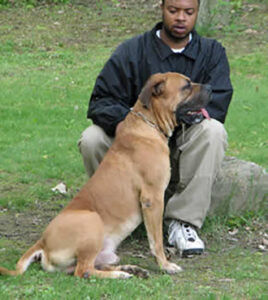Introduction
Welcome to Boerboelpuppy.com, your ultimate resource for everything related to Boerboel dog puppies. In this blog article, we will delve into the world of Boerboel puppy training, offering valuable insights and tips to help you raise a well-behaved and happy Boerboel puppy. Whether you are a first-time dog owner or have previous experience, this article is tailored to provide you with valuable information on training your Boerboel puppy.
Boerboel Puppy Training: The Key to a Lifelong Bond
Owning a Boerboel puppy is an enriching experience that brings joy, love, and companionship to your life. However, like any other dog breed, Boerboels require proper training to ensure they become well-adjusted members of your family. From basic obedience commands to socialization and housebreaking, a well-trained Boerboel puppy is more likely to grow into a confident and well-mannered adult dog.
The Benefits of Boerboel Puppy Training
Training your Boerboel puppy goes beyond teaching them basic commands and housebreaking. It plays a crucial role in developing their social skills, preventing behavioral issues, and establishing a lifelong bond between you and your furry companion. Here are some key benefits of Boerboel puppy training:
1. Strengthening the Bond
Training sessions provide an opportunity for you and your Boerboel puppy to connect and build trust. When you invest time and effort into their training, you establish yourself as the leader and create a bond based on respect and understanding. This bond will endure throughout their life, making it easier to overcome challenges and enjoy a strong relationship.
2. Ensuring Safety
Boerboels are powerful dogs, and without proper training, they may exhibit unwanted behaviors that can lead to potential safety hazards. By training your Boerboel puppy, you can teach them to respond to commands promptly, such as “come” or “stay,” which can help keep them safe in various situations. It also ensures that they don’t engage in aggressive behaviors towards other animals or humans, ensuring a harmonious living environment.
3. Promoting Socialization Skills
Socialization is a crucial aspect of Boerboel puppy training. Early exposure to different people, animals, and environments helps them develop positive social skills. A well-socialized Boerboel is more confident, friendly, and adaptable to various situations, reducing the chances of fear-based aggression or anxiety.
During the socialization process, expose your Boerboel puppy to a variety of stimuli, such as different sounds, surfaces, and experiences. Introduce them to friendly dogs of various breeds, sizes, and ages, as well as new environments, such as parks or busy streets. Encourage positive interactions and reward their good behavior, helping to shape their social skills and build a well-rounded personality.
4. Preventing Behavioral Issues
Proper training from an early age helps prevent and address behavioral issues that may arise in Boerboels. Dogs that lack training and structure are more likely to exhibit problem behaviors, such as excessive barking, digging, chewing, or aggression.
By establishing clear boundaries and teaching your Boerboel puppy appropriate behaviors, you can curb these issues before they become ingrained habits. Consistency and positive reinforcement techniques, such as rewards and praise, are effective in shaping desirable behaviors and discouraging unwanted ones.
5. Enhancing Mental Stimulation
Boerboels are intelligent dogs that thrive on mental stimulation. Training sessions provide an opportunity to challenge their minds and prevent them from becoming bored or restless. Engaging their minds in training exercises, such as learning new commands or participating in puzzle games, helps keep them mentally sharp and fulfilled.
6. Setting the Foundation for Advanced Training
Basic obedience training sets the foundation for more advanced training in the future. Once your Boerboel puppy masters the fundamentals, you can progress to more sophisticated commands or activities, such as agility training or advanced tricks. The skills and discipline they acquire during their early training will make it easier for them to excel in these endeavors and become well-rounded dogs.
Training your Boerboel puppy is a responsibility that pays off in numerous ways. Not only does it prevent behavioral issues and ensure their safety, but it also strengthens the bond between you and your furry friend. By dedicating time and effort to their training, you lay the groundwork for a lifetime of joy, companionship, and cooperation with your well-trained Boerboel companion. Remember, training is an ongoing process that requires consistency, patience, and positive reinforcement. Embrace the training journey and enjoy the rewards it brings in creating a lifelong bond with your Boerboel puppy. Here are some ways to train your Boerboel puppy.
Socializing Your Boerboel Puppy
Socialization is indeed a vital aspect of Boerboel puppy training. It involves exposing the puppy to different people, animals, and environments in a positive and controlled manner. The goal is to teach the puppy how to interact appropriately with the world around them and to develop good social skills.
Starting socialization from an early age is recommended because puppies have a critical period between 3 to 14 weeks of age when they are most receptive to new experiences. During this time, they are more open to learning and forming positive associations. By exposing the Boerboel puppy to a variety of stimuli early on, owners can prevent future behavioral issues and help the puppy become a well-adjusted adult dog.
One of the primary benefits of socialization is that it helps prevent fear and aggression towards new people, animals, and situations. By introducing the Boerboel puppy to different types of people, including men, women, children, and individuals wearing different attire (such as hats or uniforms), you can help them become comfortable and confident in various social settings. It is important to ensure that these interactions are positive and that the puppy receives plenty of praise and rewards for calm and friendly behavior.
Similarly, exposing the Boerboel puppy to other animals during socialization is crucial. This can include controlled interactions with dogs of different breeds, sizes, and temperaments, as well as introducing them to other animals such as cats, birds, or small rodents. These experiences help the puppy learn how to communicate appropriately with other animals and reduce the chances of aggressive or reactive behavior towards them in the future.
In addition to people and animals, socializing the Boerboel puppy with different environments is also essential. Exposure to various locations such as parks, streets, crowded areas, vehicles, and different surfaces (e.g., grass, sand, stairs) helps the puppy become comfortable and confident in different situations. This helps prevent fear-based behaviors such as anxiety or aggression towards novel environments and allows the puppy to adapt to different situations throughout their life.
When it comes to socializing a Boerboel puppy, it is important to remember to prioritize safety and go at a pace that the puppy is comfortable with. Gradually increase the level of difficulty and intensity of the socialization experiences, ensuring that the puppy always feels secure and supported. Additionally, it is crucial to provide positive reinforcement, rewards, and praise for desired behavior to further reinforce positive associations during socialization.
In conclusion, socialization is a vital aspect of Boerboel puppy training. Early exposure to various people, animals, and environments helps the puppy develop essential social skills, prevents fear and aggression, and ensures they grow up to be well-adjusted adult dogs. Proper socialization is best achieved through positive and controlled interactions, prioritizing the puppy’s comfort, and providing plenty of rewards and positive reinforcement
To socialize your Boerboel puppy effectively, expose them to different sights, sounds, and experiences. Take your puppy for walks in the park, introduce them to friendly dogs and other animals, and invite friends and family over for playdates. Positive reinforcement, such as treats and praise, should accompany these social interactions to reinforce desired behaviors.
Housebreaking Your Boerboel Puppy
Housebreaking, or potty training, is an essential aspect of Boerboel puppy training. Establishing a consistent routine and using positive reinforcement can greatly aid in the success of the housebreaking process, making it a more manageable and pleasant experience for both the puppy and the owner.
First and foremost, consistency is key when it comes to housebreaking a Boerboel puppy. Establishing a regular routine helps the puppy understand when and where they should eliminate. This involves taking the puppy outside to their designated potty area at specific times, such as immediately upon waking up, after meals, after playtime, and before bedtime. Being consistent with the timing helps the puppy develop a predictable schedule and understand that the outdoor is the appropriate place for elimination.
When housebreaking a Boerboel puppy, it is also important to use positive reinforcement. Rewarding the puppy for going to the bathroom outside helps them associate the desired behavior with something positive. This can be done by praising the puppy and offering treats or a favorite toy immediately after they are eliminated in the designated area. Positive reinforcement enhances the puppy’s understanding that going potty outside is desirable and encourages them to repeat the behavior in the future.
In addition to consistency and positive reinforcement, it is important to be patient and understanding during the housebreaking process. Accidents are normal and should be expected, especially in the early stages of training. Punishing or scolding the puppy for accidents can create fear and anxiety around potty training, making the process more challenging. Instead, owners should focus on preventing accidents by supervising the puppy closely when indoors, confining them to a small space or using a crate, and gradually increasing the puppy’s freedom in the house as they demonstrate reliability in potty training.
Using cues or commands can also be helpful during housebreaking. Owners can choose a specific word or phrase, such as “go potty” or “do your business,” and use it consistently when encouraging the puppy to eliminate outside. Eventually, the puppy will associate the cue with the action and understand the desired behavior.
It is worth noting that housebreaking a Boerboel puppy requires time, effort, and consistency. Some puppies may learn quickly, while others may take longer to fully grasp the concept. Being patient and persistent is key, as consistency in training and routine will eventually lead to success.
In conclusion, housebreaking is an essential aspect of Boerboel puppy training. Establishing a consistent routine, using positive reinforcement, being patient, and understanding accidents are all important considerations during the training process. With time and consistency, a Boerboel puppy can be successfully housebroken, allowing them to become a well-behaved and clean member of the family. Here are some tips to help you achieve success:
- Consistency is key: Establish a regular schedule for feeding and bathroom breaks. Take your Boerboel puppy outside to designated bathroom spots after meals, naps, and play sessions.
- Positive reinforcement: When your puppy eliminates in the appropriate spot, reward them with treats and praise. This positive association encourages your Boerboel puppy to repeat the behavior in the future.
- Monitor and prevent accidents: Supervise your puppy closely indoors, especially during the housebreaking phase. Recognize signs of them needing to be eliminated, such as pacing or sniffing around, and quickly take them outside.
- Clean accidents promptly: Accidents may happen, especially during the early stages of housebreaking. Clean any accidents thoroughly using appropriate pet odor eliminators to remove lingering scents that may attract your puppy to repeat the behavior.
Remember, patience and consistency are essential when housebreaking your Boerboel puppy. With time and consistent training, they will learn the expected behavior.
The Importance of Obedience Training
Although Boerboels are naturally intelligent and eager to please, obedience training is crucial to establishing a strong bond between you and your puppy and ensuring their safety. Teaching basic commands and leash manners forms the foundation for advanced training and creates a well-behaved Boerboel.
“Cesar Millan, widely known as the ‘Dog Whisperer,’ emphasizes the importance of obedience training for all breeds, including Boerboels. He believes that establishing a strong bond through training is essential to ensuring the safety and happiness of both the dog and the owner.
Obedience training provides a framework for effective communication between the owner and the Boerboel. By teaching basic commands like ‘sit,’ ‘stay,’ ‘come,’ and ‘heel,’ owners can effectively manage their dog’s behavior in various situations. This is especially important for a powerful and protective breed like the Boerboel. Without proper training, their size and strength can become a challenge to handle, potentially resulting in safety hazards.
Training also helps to establish the owner as the pack leader, a concept Millan strongly emphasizes. By setting rules, boundaries, and limitations through training, owners assert their authority and establish a balance within the relationship. This allows the Boerboel to feel secure, knowing their place within the family unit, and reduces unwanted behaviors such as dominance, aggression, or destructiveness.
Moreover, obedience training contributes to mental stimulation for the Boerboel. These intelligent and eager-to-please dogs thrive when given tasks and challenges to engage their minds. A well-trained Boerboel is a mentally balanced and content dog.
Additionally, obedience training lays the foundation for advanced training and activities. Once basic commands are mastered, owners can progress to more advanced skills like agility training, scent work, or even therapy dog training. This not only keeps the Boerboel physically and mentally stimulated but also strengthens the bond between the owner and the dog.
In conclusion, while Boerboels are naturally intelligent and eager to please, obedience training is crucial for establishing a strong bond, ensuring safety, and creating a well-behaved dog. Cesar Millan’s perspective on training underlines the importance of effective communication, asserting leadership, providing mental stimulation, and enabling further growth and development for both the owner and the Boerboel.”
Basic Commands for Boerboel Puppies
- Sit: Teach your Boerboel puppy to sit by holding a treat close to their nose and moving it upwards. As their head follows the treat, their bottom naturally lowers. Once in a sitting position, reward them with the treat and praise.
- Stay: Start by asking your Boerboel puppy to sit. Open your palm in front of them and say “stay” while taking a step back. If your puppy remains in the sitting position, reward them and gradually increase the distance over time.
- Come: Encourage your Boerboel puppy to come to you by kneeling down, opening your arms, and calling your name in an inviting tone. Reward them with treats and praise when they reach you.
- Leave it: Teaching your Boerboel puppy to “leave it” is crucial for their safety. Show them a treat in your closed hand and say “leave it.” When they stop trying to access the treat, reward them with a different treat or praise.
- No: Use a firm and clear voice to say “no” whenever your Boerboel puppy engages in unwanted behaviors. Pair this command with redirecting their attention to a more appropriate behavior and reward them for complying.
Leash Training for Boerboel Puppies
Leash training is indeed an essential part of Boerboel puppy training. It plays a significant role in ensuring the puppy’s safety during walks and preventing them from pulling the owner around. Proper leash training not only makes walks more enjoyable but also establishes a foundation for good behavior and obedience.
One of the main reasons leash training is crucial for Boerboel puppies is their large size and strength. These powerful dogs can easily overpower their owners if they are not taught proper leash manners. Teaching them to walk calmly on a leash reduces the risk of accidents, prevents them from darting off or chasing after distractions, and allows the owner to maintain control in various environments.
To begin leash training, it is important to introduce the Boerboel puppy to the concept of wearing a collar or harness and being connected to a leash. Start by allowing the puppy to become accustomed to wearing the collar or harness, rewarding them with treats and praise for accepting it. Gradually introduce the leash, letting them drag it around under supervision to get used to the sensation.
Once the puppy is comfortable with the collar or harness and leash, it is time to start teaching them proper leash manners. Begin in a quiet and controlled environment, where there are minimal distractions. Start by holding the leash loosely and encouraging the puppy to walk beside you. Use a confident and calm tone of voice, and reward the puppy for staying close, using treats, praise, or a favorite toy.
If the puppy starts to pull or lunge, it is important to stop moving and not allow them to proceed forward. This helps them understand that pulling gets them nowhere and that they need to stay by your side to continue walking. Once the puppy relaxes and the leash is loose again, resume walking. Consistency is key, and repeating this process consistently will help the puppy learn to walk calmly without pulling.
In addition to teaching leash manners during walks, it is also essential to use positive reinforcement to reward desirable behavior. For example, when the puppy walks nicely on a loose leash, reward them with treats, praise, or a short play session. This helps reinforce the idea that walking calmly on a leash results in positive outcomes.
As the Boerboel puppy becomes more comfortable and proficient at walking on a leash, gradually increase the difficulty level by introducing more distractions or walking in busier environments. This helps the puppy generalize their leash skills to different situations and ensures that they remain well-behaved and under control regardless of the environment.
In conclusion, leash training is an essential part of Boerboel puppy training to ensure their safety and prevent them from pulling the owner around. By teaching proper leash manners, owners can maintain control of their powerful dogs during walks, prevent accidents, and establish a foundation for good behavior and obedience. Consistency, positive reinforcement, and gradually increasing difficulty levels are key elements in effective leash training.
Here are some steps to conduct effective leash training:
- Introduce the leash: Allow your Boerboel puppy to familiarize themselves with the leash by letting them sniff and explore it in a controlled environment.
- Start indoors: Begin by attaching the leash to your puppy’s collar and allow them to walk around the house dragging the leash behind them. Supervise them to prevent any accidents or tangling.
- Encourage walking: Once your Boerboel puppy is comfortable with the leash, hold it in your hand and encourage them to follow you. Use treats and praise as rewards for walking calmly beside you.
- Address pulling: If your Boerboel puppy pulls on the leash, use a gentle and firm command, such as “heel,” and stop walking. Wait for them to relax the tension on the leash before moving forward again. Consistency is key to teaching them not to pull.
- Reward good behavior: Always reward your Boerboel puppy with treats and praise when they walk calmly on the leash, reinforcing positive leash manners.

Boerboel puppy training is a rewarding journey that strengthens the bond between you and your four-legged companion. Socialization, housebreaking, and obedience training are crucial components in raising a well-rounded and well-behaved Boerboel dog. Remember to approach training with patience, positivity, and consistency, and always seek professional guidance when needed.
If you’re ready to embark on this exciting training adventure with your Boerboel puppy, Boerboelpuppy.com is here to support you. Our comprehensive resources and expert advice are designed to help you provide the best care and training for your beloved Boerboel. Together, let’s nurture your Boerboel puppy into a confident, obedient, and loving canine companion!
FAQ
Q: How long does it take to potty train a Boerboel puppy?
A: The duration of potty training can vary depending on the individual puppy and their consistency in training. On average, it may take 3 to 4 months to fully housebreak a Boerboel puppy.
Q: Can Boerboel puppies be aggressive if not trained properly?
A: Boerboels have a naturally protective nature, and proper training and socialization play a crucial role in shaping their temperament. With early and consistent training, Boerboel puppies can grow up to be well-behaved and friendly dogs.
Q: Should I use punishment-based training methods with my Boerboel puppy?
A: Positive reinforcement training methods that reward desired behaviors are generally more effective and humane than punishment-based methods. Boerboel puppies respond well to praise, treats, and other rewards, fostering a positive learning experience.
Call-to-Action
Visit Boerboelpuppy.com today and access our extensive collection of articles, training guides, and resources. From puppy training tips to health and nutrition advice, we are your go-to source for everything Boerboel-related. Start your journey to a well-trained and happy Boerboel puppy today!









